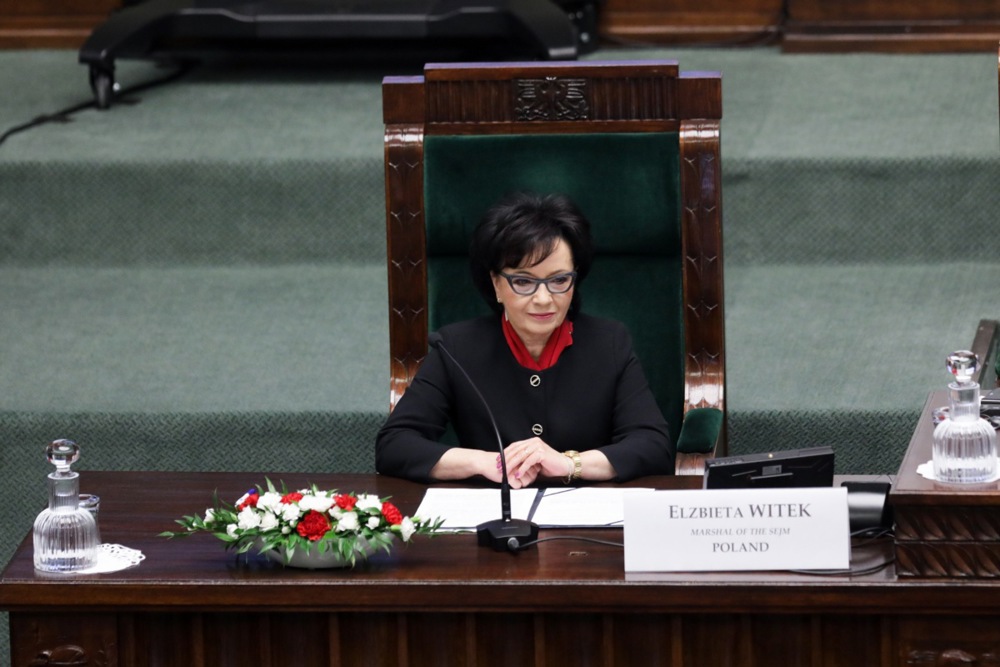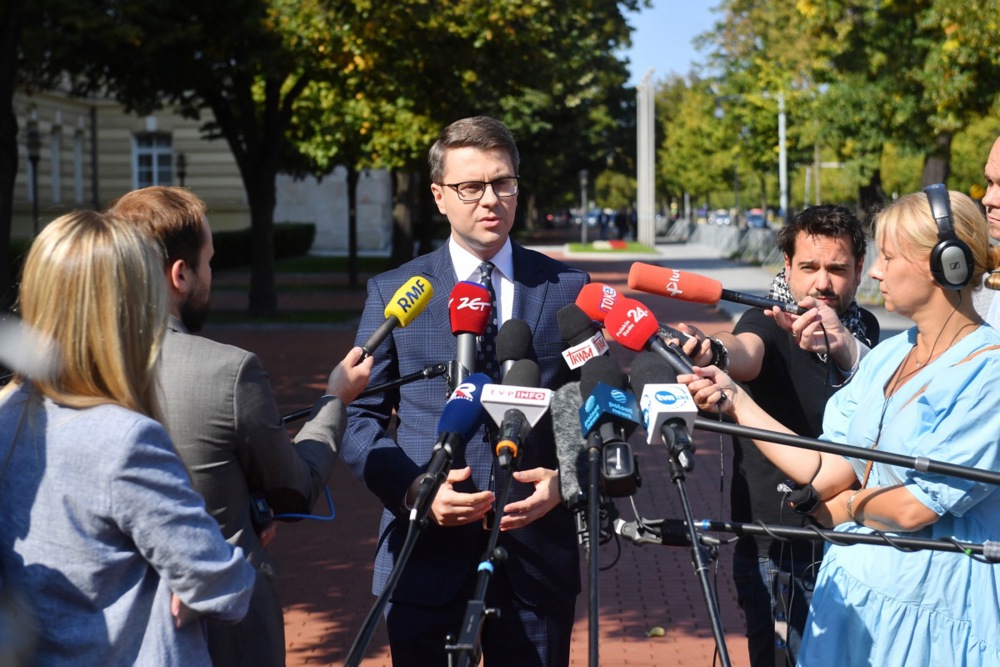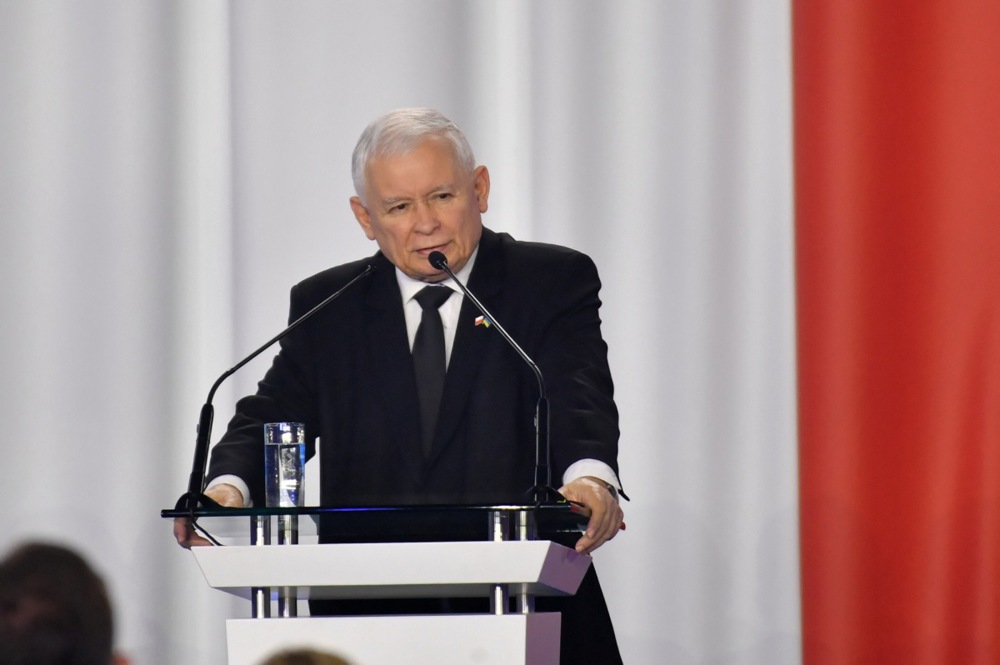The Polish parliamentary election, which will determine whether the ruling conservative PiS gets an unprecedented third parliamentary majority to extend its eight-year rule, has been set for October 15.
The two main blocks are led by Donald Tusk and Jarosław Kaczyński but there is a new force emerging that could defy the logic of polarisation between those two and claim the balance of power.
The joke doing the rounds in Poland is that Polish archeologists have uncovered a previously undiscovered Egyptian Pharaoh’s tomb. On opening the tomb the Pharaoh suddenly came to life and asked the astonished diggers where they were from. On hearing that they were from Poland he asked: “Are Jarosław Kaczyński and Donald Tusk still fighting for power?”
It’s the polarisation, stupid
For many voters it seems that the Kaczyński v Tusk struggle has been going on for ever. Both have been around in top Polish political echelons since the collapse of Communism in 1989. Both are the founders of the parties they lead.
But in reality the present cleavage in Polish politics between the PiS and the liberal Civic Platform (PO) was established in 2005 when the two parties who had been preparing for a coalition turned on each other.
In that case, the PiS claimed the conservative agenda on axiomatic issues and distrust of economic liberalism and the PO embraced social and economic liberalism. Their two standard-bearers, Tusk and the late Lech Kaczyński, Jarosław Kaczyński’s brother, went head to head in the second round of the presidential election and the two parties have remained locked in combat ever since.
Political science professor Wawrzyniec Konarski believes that the split in some ways now resembles “tribal divides”. The PiS and PO are both increasingly hermetically sealed from one another with each having its own media, versions of history and social circles.
This tribal divide was entrenched by the trauma of the Smolensk tragedy in 2010 when Lech Kaczynski, then president, and another 95 notables died in an air crash in Smolensk, close to the Katyn forest where thousands of Polish officers were killed by Stalin’s NKVD secret services in 1940.
The tragedy briefly brought Polish people together but then an argument erupted as to the cause of the crash, one which still rages today. Tusk supporters believe it was just a tragic accident, whereas opponents tend to feel it was a case of Russian foul play.
Jarosław Kaczyński in private blames Tusk for the tragedy because at the time Tusk manoeuvred for there to be two separate visits to commemorate the Katyn massacre by himself and then by Lech Kaczyński so that Tusk would get the kudos of being seen to have been hosted by Russian President Vladimir Putin without then-president Kaczyński being in the frame.
Instead of trying to resolve the issue with an independent or international inquiry into the tragedy, both sides have dug in behind their versions of events. This has entrenched and intensified the divide and mistrust between the two sides.
Today, Tusk portrays Jarosław Kaczyński as a paranoid anti-European autocrat who threatens the very existence of Polish democracy whereas Kaczyński presents Tusk as a proxy for Berlin, accusing him of having been soft on Russia and that he is a threat to the security and existence of Poland as an independent state. They both frequently use the word “evil” to describe each other.
But don’t order any popcorn for a televised debate between the two – there won’t be one. First of all because Kaczyński remembers only too well how he got outmanoeuvred and lost the election after his debate with Tusk in 2007. Second, because the ruling party mistrusts the commercial media it does not control and the public media it does control have become anathema for the opposition. Never the twain shall meet, it seems.
It may also be wise not to expect too much detailed policy debate in this election run-up. Neither of the major parties has published its manifesto and both are holding back with announcing detailed programmes until the latter stages of the campaign.
Referendum on Tusk
The PiS has decided to make the election a referendum on Tusk. Literally so. It has forced through parliament a ballot that asks four questions on topics on which Tusk has a track record that is viewed unfavourably by many voters.
He supported and implemented privatisation, so there’s a question over that issue. He actually raised the age of retirement, which the present ruling party has brought back to where it was and there’s a question on that, too. Tusk’s party was willing to accept migrants from the EU’s failed reallocation scheme of 2015 before the present ruling party came to power and stopped that, so there’s also a question regarding the present EU Migration Pact to remind voters about that. And finally, Tusk was opposed to the construction of a wall to stop illegal migration from Belarus and the PiS has placed a question on this in the referendum, too.
According to portal Onet.pl commentator Andrzej Stankiewicz, Tusk has been able to hit back by noting that it is under the present government that Poland has experienced an unprecedented wave of migration, including some from Muslim countries.
He also managed to turn the tables on the PiS over the ruling party’s policy of increasing universal welfare benefits by 60 per cent from the beginning of next year. He simply proposed it should be done from the beginning of July of this year. Finally, he skilfully turned a long-planned opposition march in June into one in support of him when the ruling party was attempting to get legislation through that would have enabled it to debar him from office over alleged Russian influence regarding his government (2007-2015).
Tusk was Poland’s prime minister between 2007 and 2014 and he personifies the record of the previous liberal government, including neglecting social spending in favour of spending on infrastructure and an unsuccessful attempt to improve relations with Russia. The PiS is reminding voters about that record at every opportunity.
Daniel Tilles, the editor of online portal Notes from Poland writes that “the attacks on Tusk may suit the ruling party but they also suit him”, meaning he becomes the centre-piece of the election and “this confirms him as the leader of the opposition”.
He may have failed to unite the whole opposition but the way the campaign is going means that the other opposition parties that have declared they want to cooperate with the PO after the election have been marginalised. Still, in recent weeks Tusk has managed to successfully sideline those rival groups, whose polling numbers have stagnated while the PO’s have risen at their expense rather than the ruling party’s.
Tusk’s potential coalition allies are struggling to make an impact
One of these groups is the “Third Way”, a centrist alliance of the once agrarian Polish People’s Party and Poland 2050, the party led by former TV celebrity and presidential candidate Szymon Hołownia.
It had hoped to project itself as the alternative to the Tusk/Kaczyński duopoly but is struggling to ensure it crosses the 8 per cent electoral threshold required for coalitions of parties. Since it has made clear that it is prepared for a coalition with Tusk and not Kaczyński, its room for manoeuvre pre- and post-election is not great.
The Left party is probably safe as regards crossing the 5 per cent electoral threshold it needs to reach. On economic issues it is actually close to the PiS although on the European Union, the role of the Church and issues such as abortion and LGBTQ+ rights they are miles apart.
But, like Third Way, the Left claims that it will only sign up to a coalition deal with Tusk and not Kaczynski. This means that “a vote for either Third Way or for the Left party is a vote for Tusk to be the next prime minister”, says Tilles
The problem for Tusk is that should one or both of his potential allies fail to cross the threshold that could lead to the PiS claiming a majority in parliament by default, as happened in 2015 when the Left and a right-wing precursor to the Confederation party failed to enter parliament.
The fact that the opposition parties are running separate slates means that they are attempting to implement a Czech rather than Hungarian scenario, observers say. In Hungary virtually the whole opposition united and ended up being trounced by Viktor Orban’s Fidesz party. But in Czechia they ran on two separate slates and managed to defeat the favourite and front runner, Andrej Babiš’s ANO party.
The rise of the alternative right’s Confederation party
According to the polls, the country is heading for a parliament in which neither the PiS nor Tusk’s opposition has a majority in parliament. This is because of the rise of the Confederation party as an alternative on the Right of Poland’s political scene. That party, an alliance of hard-line nationalists and economic libertarians, has doubled its poll ratings since the start of 2023 and had at one stage even reached 15 per cent in some opinion polls.
Politico Europe’s Poll of Polls shows the Confederation has the support of 11 per cent of the electorate. Since the PiS has 36 per cent and the Tusk’s PO has 31 per cent the Confederation could easily become the kingmaker in the new parliament.
Political scientist Aleks Szczerbiak in his analysis of the Confederation’s relative success puts it partly down to its equidistance strategy towards both the main parties. He also points to the fact that it has smartly filled the vacuum left by Tusk on economic liberalism after the opposition leader pledged to support the ruling party’s social transfers and vowed to raise public sector pay across the board by 20 per ent and to fund 0 per cent-rated mortgages.
This means the Confederation has been able to project itself as the only party that supports tax cuts and deregulation, a position that has proved attractive especially to young male voters. Among younger voters it is also benefiting from the personal duel between Tusk and Kaczyński, aged 66 and 74, respectively, whereas the leaders of the Confederation Sławomir Mentzen and Krzysztof Bosak are 37 and 41.
Confederation has been the only party willing to challenge the consensus of unconditional support for Ukraine. While it has declared it opposes Russian aggression it has expressed disquiet at the levels of support granted to Ukrainians in Poland and the levels of military aid for that country.
Public attitudes have in the past few months turned against unconditional support for Ukraine, especially after the row about grain imports and Ukraine appearing to drag its feet over addressing Polish concerns over historic issues such as the Volhynia massacre during the Second World War. This has all helped the Confederation.
A problem for the Confederation might be that its equidistance strategy may lead voters to worry about its election success causing instability. The party argues that it will not enter into government with either of the two main blocks. It is more compatible with the PiS on the EU and issues such as abortion and has a positive attitude towards the Catholic Church but it is totally at odds with the ruling party on social support and state intervention in the economy.
It has built its backing on outright criticism and rejection of the PiS, which it sees as being conservative in name only, pointing to the way the party has increased state control of the economy and welfare spending and the way it has colonised state companies and public bodies, leading to what it claims to be unprecedented levels of nepotism and cronyism.
This is why it is not impossible that the Confederation, which makes no secret of its desire to replace PiS on the Right, might prefer to see a minority government formed by Tusk to end the PiS’s hold over public media, public administration and state companies.
In addition, it might be easier to persuade Tusk’s ideologically rather light touch to succumb to its economic ideas. But a minority government in which the Confederation was facing hostility from President Andrzej Duda, the head of the central bank and the constitutional court and all PiS supporters would not be likely to last a full parliamentary term.
Overall, the Confederation remains the only possible spoiler to the Kaczynski v Tusk show. If it succeeds in its aim of taking above 10 per cent of the vote and comes a clear third in the election it will prevent either of those two blocks having a majority. Were that to occur, Poland will for the first time for 16 years awake to a politically unstable future on Monday, October 16.
Potential game changers
There are issues around that even late in the day could give one block or the other an advantage leading to a majority. Undoubtedly for the PiS that issue is security. Its election slogan is “Secure future for Poles”, which underlines the progress made regarding the military, energy, the economy and social security that has seen living standards rise with poverty and unemployment falling.
The opposition block led by Tusk is hoping it can resuscitate the abortion issue that in 2020 led to support for the PiS falling by around 5 per cent. It is holding a “march of a million hearts” on October 1, just two weeks before the election, to press the case for liberalising Poland’s restrictive abortion legislation.
The undercurrents of the abortion issue are the divisions that have emerged over the role of the Catholic Church in Poland. The Church grew in stature as a result of its importance in opposing Communism and because of Pope John Paul II being a Pole.
The PiS, with its provincial and rural base, has become a close ally of the Catholic hierarchy and has delivered the restrictions on abortion the Church had always wanted.
That closeness of Church and the seat of power has now posed problems for both. This is because, despite the conservative stance taken by the ruling party, secularisation of Polish society has if anything accelerated. Church attendances are down and not just as a result of Covid restrictions eroding churchgoing habits. An increasing number of children have been taken out of religious studies in schools by their parents.
The Catholic Church in Poland, as elsewhere, has been hit by scandals regarding the sexual abuse of minors. It has also come under fire regarding examples of some priests’ opulent lifestyles and of being portrayed as being all too willing to take resources from the public purse.
Moreover, the Church is now being portrayed as being politically partisan in favour of a ruling party that remains popular in the country’s heartlands but not in metropolitan areas which, as in other countries, remain influential for opinion forming.
This is why the opposition is hopeful that the support of priests for PiS may not be the boon it once was for the ruling party.
It also hopes that inflation, which has undoubtedly hit families hard even though it has now slowed, will also work against the PiS. The slowing down of the economy evident in the latest GDP data might also get noticed by the electorate.
But one very visible issue that could upset the PiS applecart in rural areas is the issue of Ukrainian grain. If the European Commission sticks to its present position of not extending the grain embargo on Ukrainian grain beyond September 15, visible and vocal farmers protests are likely. This calculation may well have been behind Tusk’s controversial decision to take the militant farmers’ leader of the Agrounia party on to his block’s slate, hoping that will erode the high support the PiS has in the past two decades established among farmers and in rural areas.
Support for the EU but not all things from the EU
Conspicuous by its absence from this list of potential game changers is the long-running feud between the PiS and European institutions over rule-of-law compliance. Countless European Court of Justice and EC actions against Poland over the contested judicial reforms the ruling party has been attempting to make have not made that much impression on the public.
The reason is that the Polish public has on the whole a rather jaundiced view of its judiciary. The opposition had hoped that the blocking of €35 billion from the EU post-Covid pandemic funds as a result of the dispute might have traction with the voters but they have been disappointed. First of all, that blockage has not had any major impact on the economy or living standards. Moreover, voters do have suspicions about foreign interference, which the ruling party has exploited.
It is a fact that in opinion polls the Polish public expresses mass support for the EU and all the funds, trade and mobility it brings. But that does not mean they love all Brussels’ policies.
The same electorate are adamant about their opposition to Poland adopting the Euro as its currency and the EU Migration Pact and there is also unease with regard to the EU’s climate policies affecting people’s living habits and standards.
The differences between the PiS and the Confederation and Tusk’s opposition parties over the EU are deep, yet they do not make much electoral impact. Tusk and his party are enthusiastic about European integration in all its forms. Kaczyński is wary of German domination and of Brussels extending its powers over Member States, yet the debate on the future of the EU has tended to go over the heads of the electorate.
There can be no doubt for whom the majority in the EC and the European Parliament will be rooting in Brussels so that Poland returns to the mainstream and backs more, not less, European integration. This is why Tusk has been enthusiastically endorsed by the EPP, the party he once led, and which is also more than agreeable to Renew Europe, the Socialists and the Greens.
A Polish Government willing to green-light the EC’s climate change and migration policies and to consider forgoing the power of Member States’ veto would mean Christmas had arrived early in Brussels. A majority for the PiS, or having the Polish Government of whatever political hue a prisoner of the Confederation party, would be more a case of a nightmare at Christmas for the Eurocrats.
The morning after
If the election produces no majority for either side, an outcome highly likely according to current polling, political scientists see Poland going through a period of high-octane political turbulence.
Professor Antoni Dudek believes there could be another election as early as next year or that, in the best-case scenario, a period of unstable minority government or governments may be resolved by the presidential election due in 2025 when President Duda ends his second term and cannot stand for another. That presidential election, he feels, may produce a new political cleavage in Polish politics that could sweep away the current PiS-PO divide.
Fellow political scientist Rafał Chwedoruk is not convinced that Poland might have to go through an Israeli- or Bulgarian-style experience of having to hold election after election. He believes that once the parties and their MPs are elected to parliament, the last thing any will want would be another election.
The Polish Constitution may be of help here; it allows for the election of a minority government if the right number of MPs abstain or do not turn up at the third time of trying to form a government. The fact that the country faces European parliamentary elections and all-out local government elections in the spring of 2024 and a presidential election in the spring of 2025 may quench the thirst for fresh elections and concentrate minds on finding a way out of any impasse.
But in the febrile atmosphere of today’s Polish politics, nothing can be ruled out.





